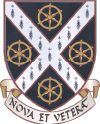Catz Fellow wins 2024 Frontiers of Science Award
Catz Fellow and Professor of Mathematics, Marc Lackenby, has been awarded a Frontiers of Science Award 2024, which will be given at a ceremony in Beijing on 14 July.
Explaining his research, Professor Lackenby says: “The research for which I won the prize was on a very simple question in topology. You have a piece of string tied up to form a closed, possibly knotted, loop (for example as in the above figure). How can you decide whether it is genuinely knotted or whether it can be deformed to a round circle? You want an algorithm that answers this question, ie a completely reliable method that can be implemented on a computer.
The question was flagged up by Alan Turing in his last published paper “Solvable and Unsolvable Problems”. He was clearly thinking that perhaps this problem is not solvable (and in fact, higher-dimensional versions of the problem are provably unsolvable). But it was in fact resolved in the 1960s by Wolfgang Haken.
What I have shown is that when a loop is not knotted, then there is an efficient and elementary method of untangling the loop. My proof uses quite a wide array of different techniques from 3-dimensional topology, together with some ideas from the theory of dynamical systems. The 74-page proof was published in the Annals of Mathematics.
The actual theorem is as follows. You are given a projection of the knot to the plane, with n crossings. I showed that there is a sequence of simple modifications to the knot projection, called Reidemeister moves, taking it to the round circle. Crucially, the number of these moves is at most a polynomial function of n: at most (236n)^{11}.”
You can read more about his research in the article, Catz Fellow Ties Himself in Unknots.
This is the second year that a Catz Fellow has been granted a Frontiers of Science Award, after Professor Graeme Segal won last year.
We extend our congratulations to Professor Lackenby on this prestigious award.


